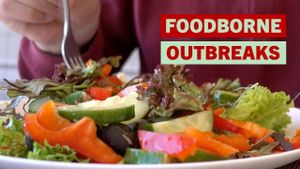Healthy eating habits and successful weight loss transformations have been at the forefront of many discussions lately, gaining traction through social media and various diet plans. These transformations exemplify the potential of disciplined healthy eating, showcasing how nutritional choices can dramatically shift one's health and lifestyle.
The emergence of the "Quarantine 15" phenomenon due to the pandemic has led many people to search for effective strategies for weight management. With so much emphasis on diet and healthy habits, the spotlight has turned to popular diets and their effectiveness.
One of the standout diet plans is the Mediterranean Diet, which has dominated the rankings for the best overall diet for several years now. This diet encourages consuming fruits, vegetables, whole grains, fish, and healthy fats, providing both enjoyable meals and substantial health benefits.
Interestingly, this acclaimed diet hasn't always been the top pick among best-selling diet books. Despite this diet being recognized by health experts, many Americans lean toward persuasive quick-fix diet plans, which often focus on immediate results rather than sustainable lifestyle changes.
Popular books such as "The Whole30" and "The 17 Day Diet" outline restricted eating regimens aimed at achieving rapid weight loss. While these methods may yield quick results, experts argue these tactics often ignore the importance of balanced nutrition.
Princess Kate, known for her culinary skills, has also adopted healthy eating habits, particularly during her cancer treatment. By sticking to nutrient-rich meals, she emphasizes the importance of nutrition not just for health but also for recovery from illness.
She often starts her day with smoothies packed with greens and antioxidants to energize her mornings. These choices reflect not just personal preference, but also align with medical advice promoting whole foods for heightened well-being.
Dr. Ramia Mokbel highlights how patients undergoing chemotherapy benefit from diets rich in proteins, vitamins, and healthy fats. This forms another layer of how food quality can significantly impact health, especially during challenging health circumstances.
For those seeking inspiration from real-life transformations, Alicia Briggs is one of the most notable examples. Having once weighed over 429 lbs (195 kg), her determination to change began with the critical realization of the potential impact on her children.
Alicia underwent surgery as part of her weight loss strategy after years of trying numerous diets. This pivotal choice marked the beginning of her rigorous commitment to physical fitness, leading her to become not just healthier, but also to pursue bodybuilding as a passion.
Throughout her transformation, Alicia discovered the empowering effects of regular exercise and reliable nutrition. From being bedbound, she inspired others through social media, where she documented her progress as she leaned on the support of fitness communities.
The emphasis on educational content is gaining traction, with many individuals sharing their journeys online to promote better eating habits. This trend is not just about losing weight, but about fostering healthy relationships with food.
People are also increasingly turning to technology to aid their dietary choices. Fitness apps and engaging platforms have become instrumental tools for followers of various diets, enabling tracking of calories, nutrients, and even water intake.
While trendy diets dominate sales charts, the nutritional scientists advocate for enduring lifestyle changes over temporary regimens. The idea is clear: success lies not just within the confines of losing weight but involves creating healthy habits sustained throughout life.
Such transformations are not limited to weight loss but extend to enhancing overall life quality. With the right choices, people like Alicia Briggs are proving dramatic weight loss does not have to come at the expense of pleasure or satisfaction with food.
Dieting need not be restrictive; rather, it can involve experimentation with healthy foods, creating positive experiences around meals. Encouraging balanced nutrition as well as the joy of cooking can play pivotal roles on the path to achieving health goals.
Overall, the intersection of healthy eating and lifestyle changes seems richer than ever. From inspiring stories to scientifically-backed diets, the quest for healthier living continues to evolve, capturing the interest of many seeking improvements.
Alicia and Kate’s stories exemplify dramatic changes linked to committed choices, firmly positioning healthy eating not merely as beneficial but as transformative. If they can do it, so can countless others who are ready to take the plunge and revamp their relationship with food and fitness.



